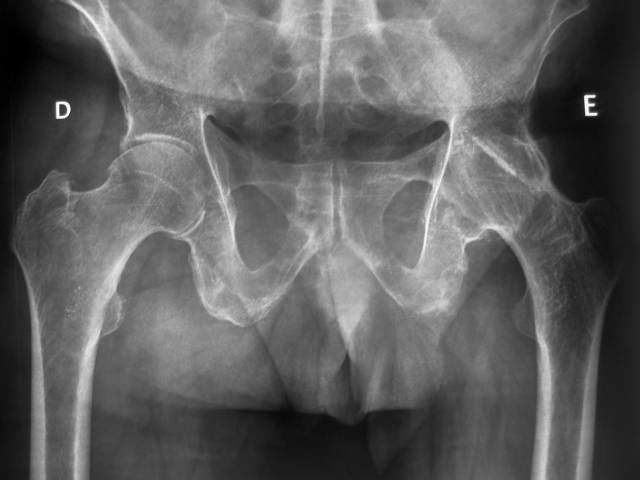Ankylosing spondylitis
Spondyloarthritis, also known as spondyloarthropathy, is a family of inflammatory rheumatic diseases that trigger arthritis. This pathology is distinguished from other types of arthritis by compromising the junction points between ligaments and tendons with the bones, known as “entheses”. The manifestation of symptoms comes in two main forms. The first involves inflammation, generating pain and stiffness, more often in the spine. Some variants affect the hands, feet, arms or legs. The second form of symptoms is related to bone destruction, causing deformities in the spine and affecting the functioning of the shoulders and hips.
Ankylosing spondylitis stands out as the most common variant within this family of diseases, focusing mainly on the spine. Others include axial spondyloarthritis, which mainly affects the spine and pelvis joints; peripheral spondyloarthritis, which mostly affects arms and legs; reactive arthritis (formerly known as Reiter’s syndrome); psoriatic arthritis; and enteropathic arthritis or spondylitis associated with inflammatory bowel diseases, such as ulcerative colitis and Crohn’s disease.
The underlying cause of spondyloarthritis lies in genetic factors, ankylosing spondylitis being hereditary and linked to multiple genes, among them, HLA-B27, the latter being prevalent in people of white descent with the disease.
Enteropathic arthritis, a form of chronic inflammatory arthritis, is commonly associated with ulcerative colitis and Crohn’s disease. The presence of the HLA-B27 gene increases the propensity to develop this variant.
In terms of diagnosis, this requires a thorough evaluation by the doctor, considering the medical history, a physical examination and possibly imaging or blood tests. The HLA-B27 gene can be detected in a blood test, but its presence does not necessarily guarantee the development of spondyloarthritis.
Regarding treatment, the importance of physical therapy and specific exercises for the joints is emphasized. Pharmacotherapy includes nonsteroidal anti-inflammatory drugs (NSAIDs) that provide relief for many patients. In cases of localized inflammation, corticosteroid injections can be effective.
For those who do not respond to these treatments, disease-modifying antirheumatic drugs (DMARDs) such as sulfasalazine or biologic therapies such as tumor necrosis factor-alpha blockers or interleukin 17A inhibitors are considered.
Surgical treatment, such as total hip replacement, may be beneficial in specific cases. In addition, patients with spondyloarthritis should be alert to possible complications, such as osteoporosis, uveitis, inflammation of the aortic valve of the heart, psoriasis and intestinal inflammation.
Living with spondyloarthritis means struggling with varying symptoms of pain, fatigue and stiffness. Despite these challenges, many patients lead productive lives thanks to advances in treatment. Regular exercise, smoking cessation and support from specialist groups can help improve the quality of life for those dealing with this condition.

